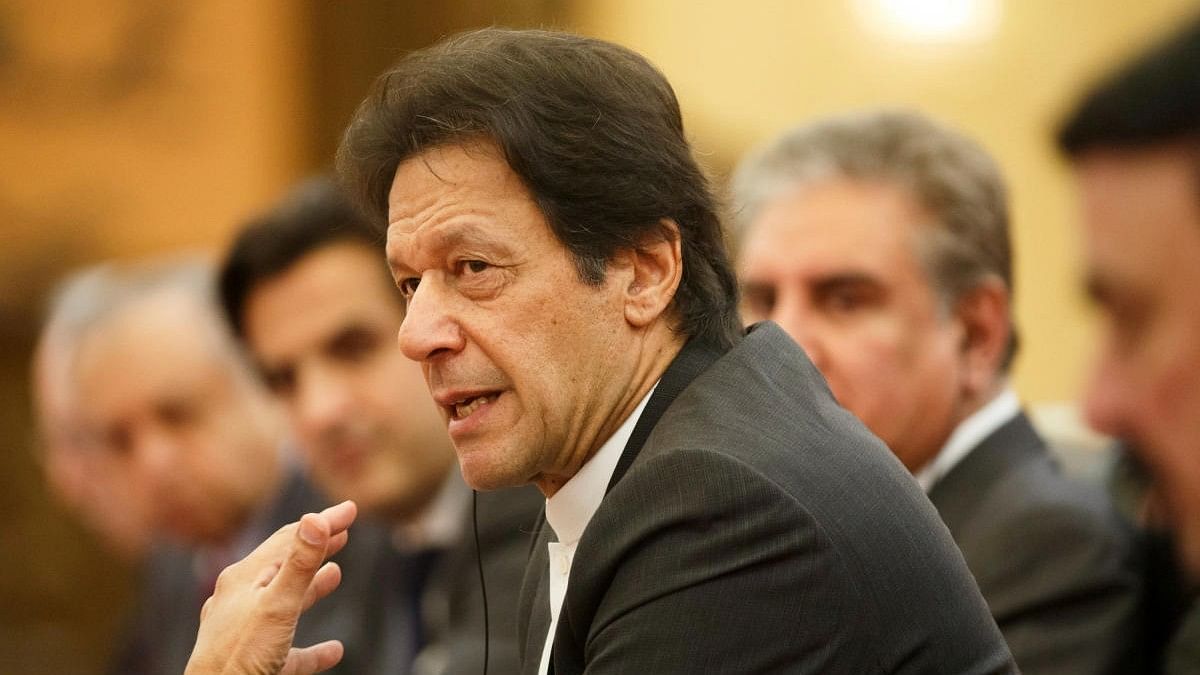
File photo of former Pak prime minister Imran Khan.
Credit: Reuters Photo
Peshawar: In a huge blow to jailed former prime minister Imran Khan's beleaguered party, a top Pakistani court on Thursday unanimously rejected the Sunni Ittehad Council's petition challenging the election commission's decision to allocate reserved seats for women and minorities in the national and provincial legislatures meant for it to other parties.
The Sunni Ittehad Council (SIC), a political alliance of Islamic political and Barelvi religious parties in Pakistan, joined by Khan's Pakistan Tehreek-e-Insaaf party-backed independents who won the elections had filed the petition.
The petition sought the directives of the court to the Election Commission of Pakistan (ECP) to allocate reserved seats to the council based on their strength in the national and provincial assemblies.
A five-member Peshawar High Court, which heard the SIC's petition unanimously rejected it, Geo News reported.
The ECP last week said the SIC, is not entitled to claim quota for reserved seats due to having “non-curable legal defects and violation of a mandatory provision of submission of party list for reserved seats which is the requirement of law”.
There are 70 reserved seats in the National Assembly and 156 in the provincial assemblies that are allotted proportionally to the winning parties in the general elections.
The reserved seats were allocated to all political parties according to their strength in the assemblies except the PTI-backed SIC.
On Wednesday, Attorney General for Pakistan Mansoor Usman Awan and the counsels for the Pakistan Peoples Party and the ECP had completed their arguments.
Awan had argued that a political party could get reserved seats only if it won a general one. ECP lawyer Sikander Basheer Momand supported his arguments, stating that the SIC was a political party but not a parliamentary one.
Though more than 90 independent candidates backed by Khan's PTI won the maximum number of seats in the National Assembly, the Pakistan Muslim League-Nawaz (PML-N) led by former prime minister Nawaz Sharif and the Pakistan Peoples Party (PPP) led by former foreign minister Bilawal Bhutto struck a post-poll deal and formed a coalition government last week.
During his arguments, SIC's lawyer Barrister Ali Zafar said the Constitution does not mention when a party has to submit a list of names for reserved seats to the ECP.
"It is not written anywhere that you cannot resubmit the list or when it has to be submitted," he argued, adding that there is no restriction on providing a second list and that the ECP could have issued a second schedule, as it did for the general elections. The plea was heard by a five-member bench led by Chief Justice Mohammad Ibrahim Khan and comprising Justice Ijaz Anwar, Justice Ishtiaq Ibrahim, Justice Shakeel Ahmad and Justice Arshad Ali.
"As per the law, those who participate in elections will get seats," Justice Anwar remarked.
The court then questioned Barrister Zafar if it wasn't clearly stated anywhere that the second schedule could not be issued.
"The law does not prevent the Election Commission from issuing another schedule," the lawyer responded.
Justice Arshad earlier argued that whoever wins the number of seats, gets reserved seats in the same proportion.
"Their seats cannot be increased," he observed.
"If these seats are not given, the parliament will not be complete," remarked the chief justice, responding to which the lawyer requested the court to interpret the Constitution in a way that there remains no gap in its interpretation.
Barrister Zafar told the court that the ECP has the authority to [make] laws to maintain justice. He added that there is also an election for reserved seats, and that, too, should be transparent.